Comparison of Top Real Estate RFP Management Tools and Buying Guide
This article breaks down how RFP management tools are reshaping the real estate sector, helping firms simplify communication, maintain accuracy, and shorten bid cycles.

Real estate projects move fast, and every missed proposal deadline can mean losing a valuable contract or vendor opportunity. Yet, many firms still rely on manual spreadsheets, email threads, and scattered templates to manage RFPs, slowing down responses and creating inconsistencies across bids.
As competition intensifies, the need for organized and technology-driven proposal management has never been greater. In fact, the proposal management software market was valued at $2.33 billion in 2022 and is projected to reach $5.81 billion by 2030, underscoring how rapidly companies across industries are embracing automation to improve efficiency and win more deals.
This article breaks down how RFP management tools are reshaping the real estate sector, helping firms simplify communication, maintain accuracy, and shorten bid cycles. You will discover the top platforms built for real estate, how they compare in features and pricing, and the key factors to consider before making your choice.What is Real Estate RFP Management?
What Is Real Estate RFP Management Software?
Real estate projects involve many vendors, documents, and deadlines. Managing all of this through ad-hoc files and email threads makes updates easy to miss and slows progress.
Real estate RFP management software brings the entire workflow into one place. You can create and send RFPs, manage vendor communication, track milestones, and route approvals on a single platform.
Modern tools also store reusable templates and answers, keep content current, and automate routine steps like formatting and deadline reminders. For developers, property managers, and procurement leads, that means less admin and more time moving deals forward.
The result: a clear, traceable process that adds speed and consistency to a critical part of real estate operations.
Why Real Estate Businesses Need RFP Management Tools
Winning new contracts in real estate often depends on how fast and accurately your team can respond to proposals. When coordination happens through emails, spreadsheets, and disconnected systems, it slows decision-making and increases the chances of costly mistakes.
RFP management software centralizes the process, standardizes content, and automates handoffs, so every submission is complete and on time.
Here’s how it helps:
- Cut repetitive effort: Automate document creation, review cycles, reminders, and follow-ups so your team can focus on evaluating the best bids rather than formatting and paperwork.
- Keep facts consistent: Maintain approved templates, vendor information, and response content in one organized library, ensuring every proposal reflects accurate, up-to-date details.
- Work together in real time: Share dashboards, assign responsibilities, and track progress on a single platform instead of relying on long email threads or version conflicts.
- Make timely calls: Use built-in analytics to monitor upcoming deadlines, identify bottlenecks, and assess which vendors or proposals deliver the strongest ROI.
- Stay audit-ready: Keep version histories, access logs, and approval records intact for compliance and governance, important for regulated or large-scale real estate projects.
Taken together, these capabilities turn a fragmented process into a reliable system, helping real estate firms respond faster and win more with less effort.
Top Real Estate RFP Management Tools
Choosing the right management tool determines whether a team can meet the demands of the real estate industry or fall behind competitors. Real estate RFP management tools bring automation, centralized data, and real-time collaboration to proposal teams, enabling you to compete effectively for multimillion-dollar real estate projects.
Below, we compare the top real estate RFP management tools, examining their features, pros, cons, and pricing models to make your choice informed and data-driven:
Inventive AI
If you want next-generation AI at the core of your real estate RFP process, Inventive AI stands out as one of the most advanced real estate RFP management platforms available. Its foundation is an agentic AI system that doesn’t just draft responses but actively manages the full lifecycle of RFPs.
The platform ingests and organizes data from RFPs, CRMs, spreadsheets, property management systems, and knowledge bases like Notion, Confluence, and SharePoint. Proposal teams can connect existing Q&A libraries, upload legacy content, and centralize information into a continuously updated knowledge hub. This makes Inventive AI not a static repository but a dynamic command center for RFP workflows.
Key Features
- AI-Enabled Content Management: Continuously reviews, updates, and organizes proposal content using agentic AI.
- Multi-Format & Multi-System Integration: Works with RFPs, contracts, CRMs, SharePoint, Google Drive, Notion, Confluence, and real estate-specific systems.
- Version & Compliance Management: Tracks revisions, flags conflicts, and ensures responses meet zoning, lease, and regulatory requirements.
- AI Drafting Agents: Specialized agents support brainstorming win themes, analyzing competitor positioning, and structuring RFP requirements.
- AI Context Engine: Pulls from deal-specific data, past proposals, and compliance libraries to generate highly contextual responses.
- Real-Time Collaboration: Cross-functional teams—SMEs, compliance officers, sales—work in one space with structured workflows and Slack integration.
- Analytics & Insights: Dashboards track reuse rates, response times, and win correlations to refine both content and process.
Pros
- Agentic workflows that automate micro and strategic RFP tasks end-to-end.
- Contextual responses with citations and confidence scoring to support compliance and reviewer trust.
- Continuous learning from past submissions to improve accuracy and adapt to sector-specific requirements.
- Seamless integration with knowledge systems and cloud drives, reducing version sprawl.
- Advanced support for complex, multi-stakeholder real estate deals where compliance and accuracy are critical.
Cons
- Limited analytics compared to some other solutions.
Best For: Inventive AI is best for real estate organizations and enterprise sales teams managing high-stakes, compliance-heavy RFPs. It is particularly valuable where speed, accuracy, and cross-functional collaboration directly impact deal outcomes, such as real estate investment firms, property management companies, and development groups responding to multimillion-dollar bids.
Gartner Rating: 5/5
Here’s what our client says about Inventive AI:
“Inventive AI shifts RFP approach from chaos to clarity. Inventive has completely streamlined my RFP process. We’re now 90% faster, and our win rate has increased by 50%.” Shikha Chauhan, Product Manager at Hexalog
Curious how much time and budget your team could reclaim with Inventive AI? Try our ROI calculator to estimate savings and returns based on your current RFP workload.
Loopio
Loopio helps real estate teams manage and reuse approved proposal content through a clean, centralized library and workflow system. However, its AI lacks contextual depth, meaning complex responses still need heavy manual input to reach executive-level quality.
Key Features
- Proposal Builder: Generates on-brand, structured submissions that reflect real estate project scopes, whether for mixed-use developments or multi-property service bids.
- Content Library & Curation: Centralizes pre-approved language for lease negotiations, construction proposals, and financial disclosures, making it searchable and audit-ready.
- Generative AI Integration: Accelerates drafting for sections like compliance narratives or due diligence documentation, with safeguards for accuracy and brand control.
Pros
- Mature, enterprise-tested platform trusted across large-scale organizations.
- Compliance-ready features with workflows for reviews, audits, and approvals.
Cons
- Implementation and content migration can be resource-intensive for new adopters.
- Interface and feature depth may feel heavy for smaller firms or first-time RFP teams.
- Limited contextual awareness for complex or multi-site proposals.
Gartner Rating: 4.4/5
Ideal for content standardization but falls short for nuanced, persuasive RFPs. Real estate enterprises eventually outgrow Loopio when advanced AI and governance become important.
Responsive AI
Responsive offers strong Q&A matching and large import capabilities, making it suitable for handling bulk questionnaires. However, its complex workflows and weaker AI narrative capabilities limit its ability to deliver fast, persuasive proposals in high-stakes real estate bids.
Key Features
- Responsive LookUp: Direct access to the content library from CRMs and collaboration apps without switching systems.
- Real-Time Project Management: Task assignment, review cycles, and progress tracking aligned to proposal deadlines.
- Advanced Analytics: Measures content usage, response efficiency, and team performance across projects.
Pros
- AI-powered answer library ensures accurate, ready-to-use content.
- Scales effectively for large portfolios and multi-property teams.
Cons
- Initial setup can demand significant resources.
- Advanced functionality requires onboarding and training.
- Complex workflows add unnecessary administrative effort.
Gartner Rating: 4.3/5
Responsive is reliable for managing volume but lacks the agility and intelligence needed for real estate RFPs that demand tailored storytelling and compliance accuracy.
Suggested Alternative: Inventive AI
If you need more than volume management, Inventive AI outperforms Responsive with context-aware automation, real-time learning, and audit-ready accuracy, delivering faster, smarter, and more compliant real estate proposals.
AutogenAI
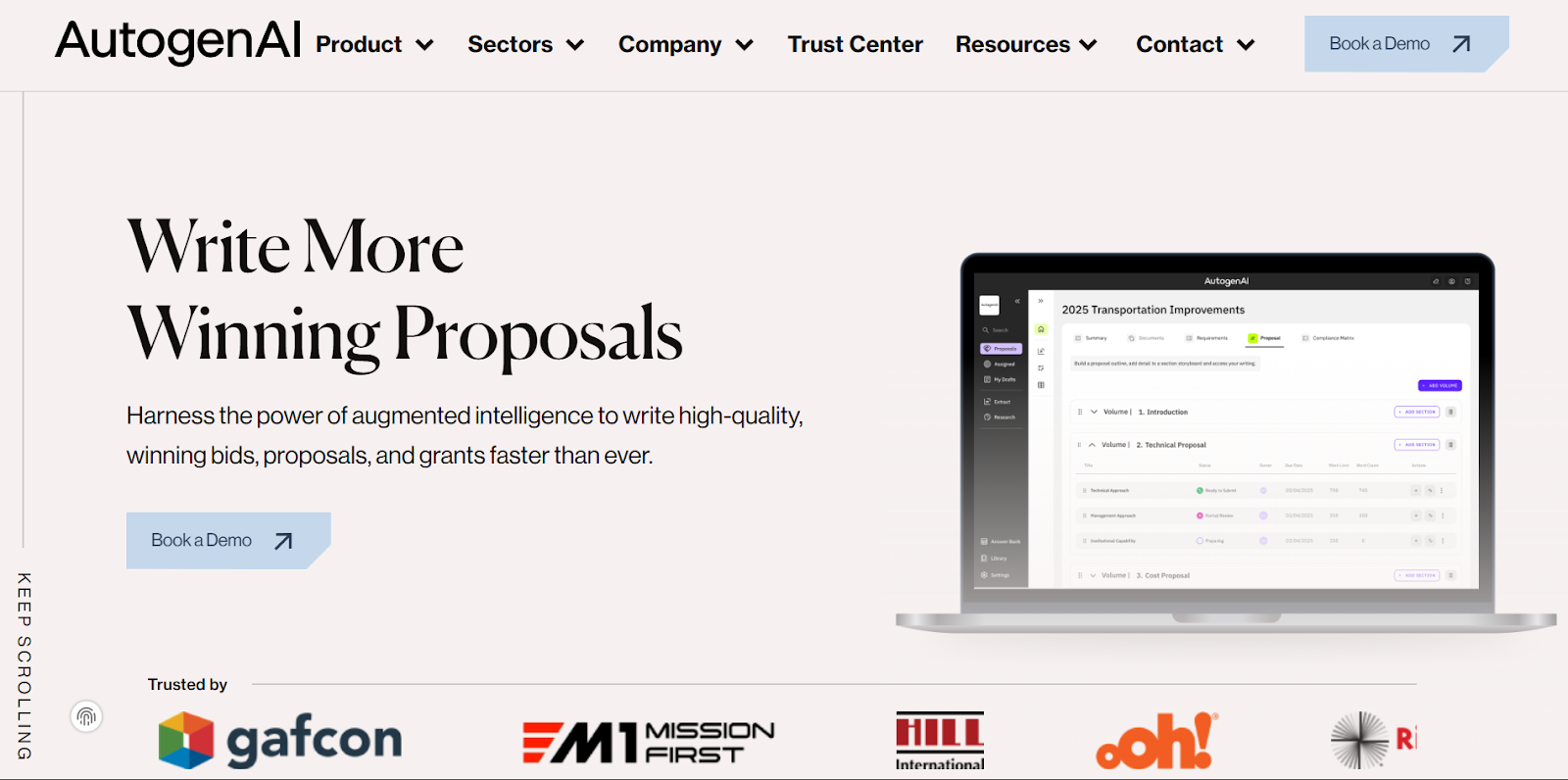
Autogen AI generates quick drafts using AI for straightforward proposals, making it suitable for smaller or less complex RFPs. However, it lacks the depth, accuracy, and governance controls that enterprise real estate operations require.
Key Features
- Research Assistant Agent: Analyzes internal records and external market data to surface zoning regulations, property histories, and vendor performance insights for proposal teams.
- Generative Content Creation: Produces initial drafts for proposals, bids, and contracts tailored to procurement frameworks.
- Customization & Compliance: Applies industry-specific compliance rules, adapting tone and ensuring adherence to zoning, environmental, or financial reporting standards.
Pros
- Strong capacity for generating long-form, compliance-ready content tailored to regulated environments.
- Custom-trained AI models reflect organizational content and industry language.
Cons
- Accuracy drops in complex or compliance-heavy proposals.
- Limited permissions and governance tools.
- Weak integration with enterprise systems and content sources.
Gartner Rating: N/A
A good starting point for small teams, but it cannot handle the rigor, compliance, and precision required for high-value real estate bids.
AutoRFP.AI
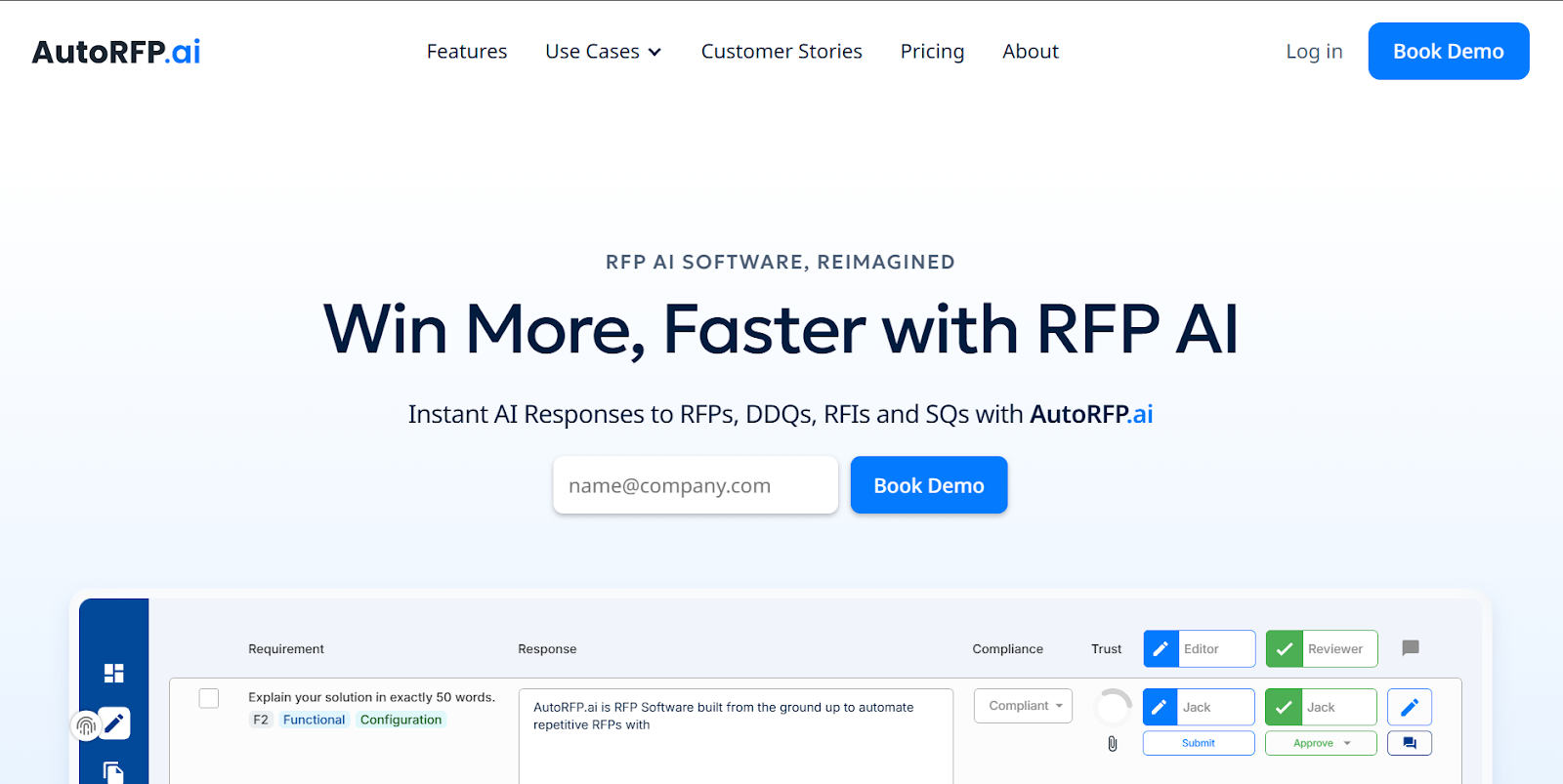
AutoRFP.AI accelerates responses using templates and AI-powered drafting. While it improves initial speed, its accuracy and compliance controls fall short for complex or regulated real estate proposals.
Key Features
- Real-time collaboration: Unlimited users with assignment, review, and approval workflows.
- Omnichannel integration: Slack, Teams, Chrome, and Edge extensions for direct RFP drafting in web portals.
- Analytics and reporting: Tracks proposal quality, win patterns, and operational efficiency.
Pros
- Accelerated draft generation with generative AI.
- AI-driven scoring improves proposal accuracy and compliance.
Cons
- Project-based pricing may escalate with high RFP volumes.
- Industry-specific tuning of content libraries requires upfront configuration.
- Struggles with multi-portfolio or multi-entity operations.
Gartner Rating: 5/5
Speed alone doesn’t win enterprise deals. Without strong accuracy and compliance checks, AutoRFP.AI is best suited for small-scale or low-risk RFPs.
Proposify
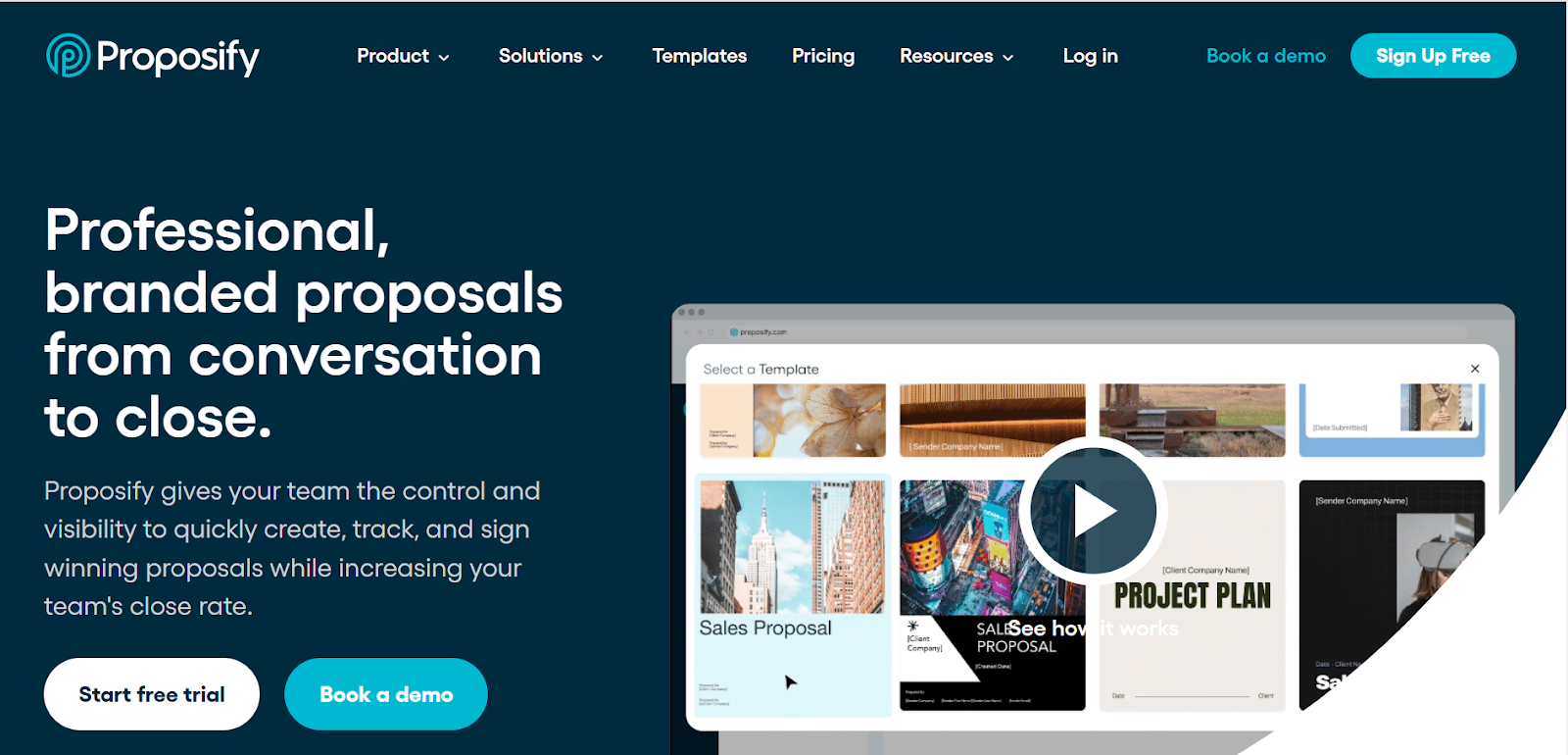
Proposify focuses on creating well-designed, branded documents with e-signature capabilities. While ideal for sales proposals, it lacks the automation, AI intelligence, and governance that real estate RFPs demand.
Key Features
- Centralized content library: Stores templates, case studies, pricing tables, and disclosures for consistent document assembly.
- Collaboration tools: Internal commenting, live edits, and notifications streamline multi-stakeholder review cycles.
- CRM integrations & workflow automation: Syncs with Salesforce, HubSpot, and Pipedrive for automated population of deal and contact data.
Pros
- Strong brand control with flexible templates.
- Available in multiple languages, supporting international deals.
Cons
- Limited AI capabilities; emphasis is on design and presentation.
- Not purpose-built for complex RFP workflows.
- Weak compliance and version control.
Gartner Rating: 4.2/5
Great for branding and aesthetics but unsuitable for enterprise-level RFP management in real estate.
Qvidian
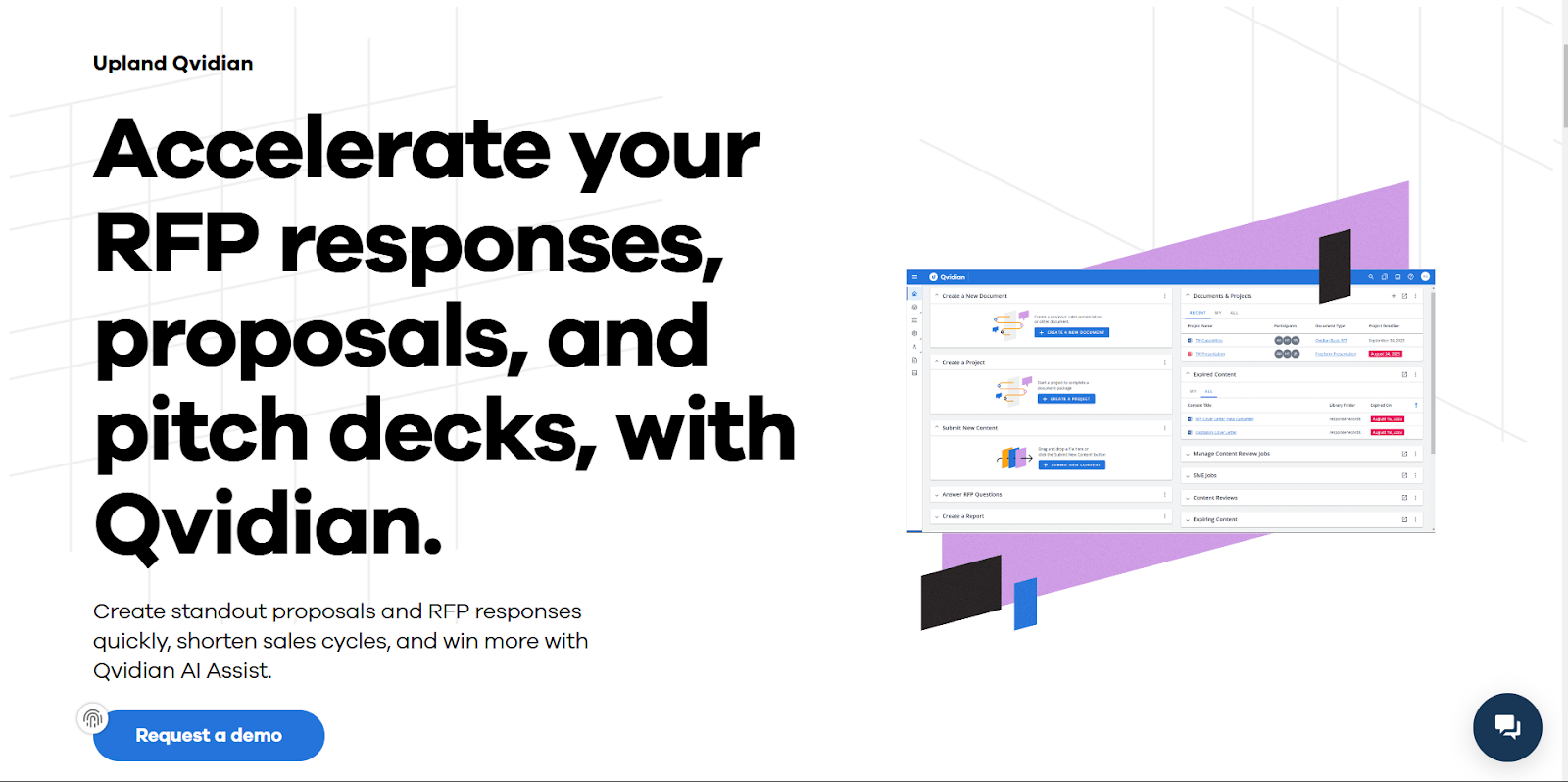
Qvidian emphasizes control and branding through templated workflows and governance. However, its dated interface and limited AI functionality make it slower for modern real estate teams that prioritize agility.
Key Features
- SME assignment by content block: Routes ownership of technical and compliance language to designated subject matter experts.
- Workflow automation: Custom task routing and layered approvals to handle complex review cycles across departments.
- Advanced integrations: Connects with Salesforce, Microsoft Word, and Slack for data pulls, formatting continuity, and communication.
Pros
- Supports rigorous compliance requirements through structured review.
- Highly scalable for organizations with large proposal volumes.
Cons
- Slower drafting and restricted flexibility.
- Minimal AI assistance for contextual writing.
- Requires heavy admin and user training.
Gartner Rating: 4.7/5
Dependable for template control, but not ideal for real estate firms that need dynamic AI, faster turnarounds, and more persuasive proposals.
QorusDocs
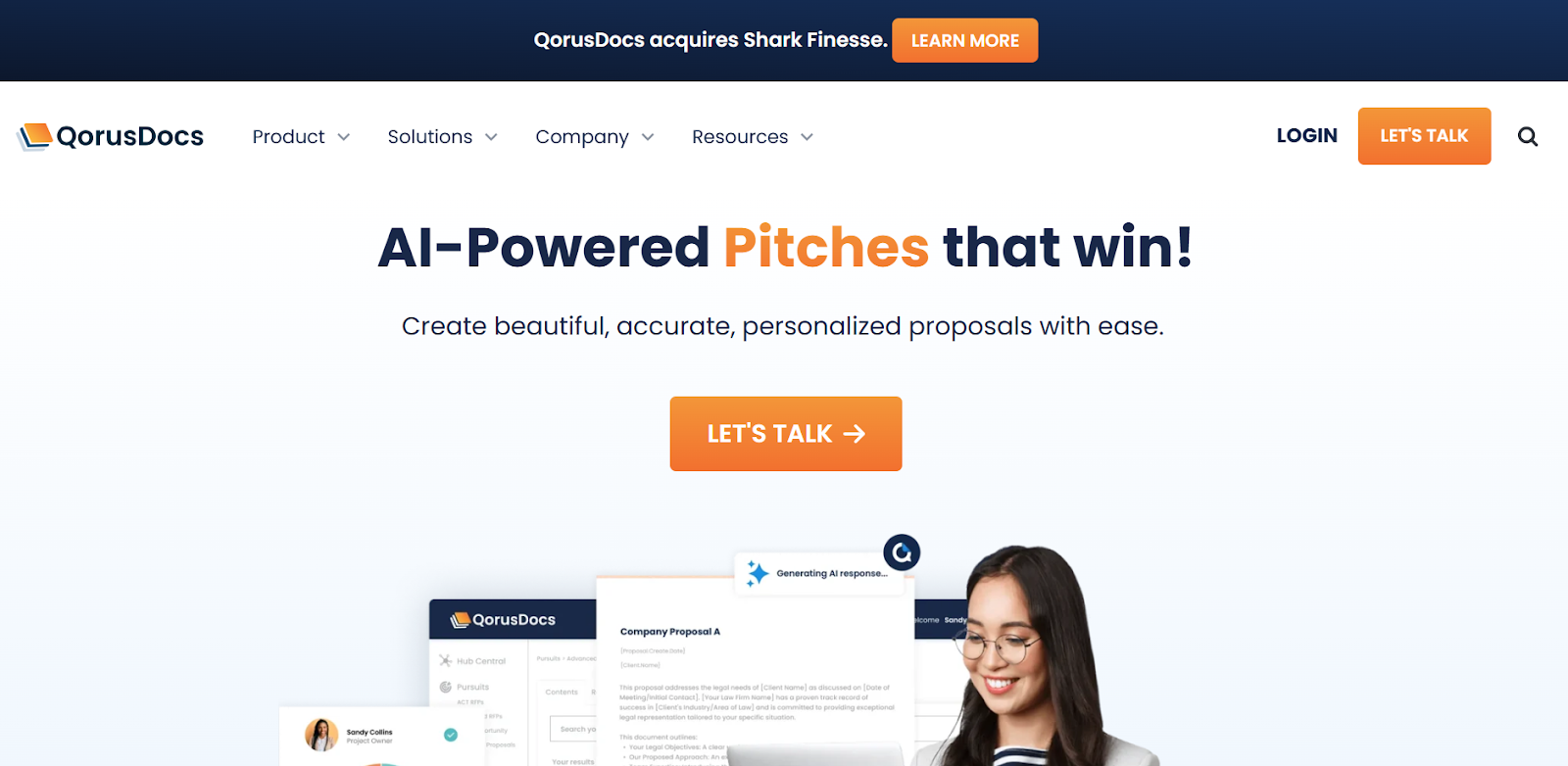
QorusDocs integrates with Microsoft 365 to automate proposal creation and document assembly. However, its limited AI capabilities prevent it from understanding complex real estate terminology and nuances.
Key Features
- Central repository with tagging and versioning: Keeps real estate proposal content organized, searchable, and current.
- Template and style controls: Enforces consistent branding across property proposals and RFP submissions.
- Role-based access and approval workflows: Assigns permissions and automates routing to maintain compliance.
Pros
- Deep integration with Microsoft 365 tools is widely used in real estate operations.
- Granular control over content access and editing for multi-team RFP projects
Cons
- Effective only for organizations already committed to Microsoft 365
- Initial library setup and tagging can require significant time investment
- Only basic analytics for large-scale operations.
Gartner Rating: N/A
Fits well into Microsoft environments but lacks the deep intelligence and contextual understanding required for enterprise-level real estate RFPs.
Arphie
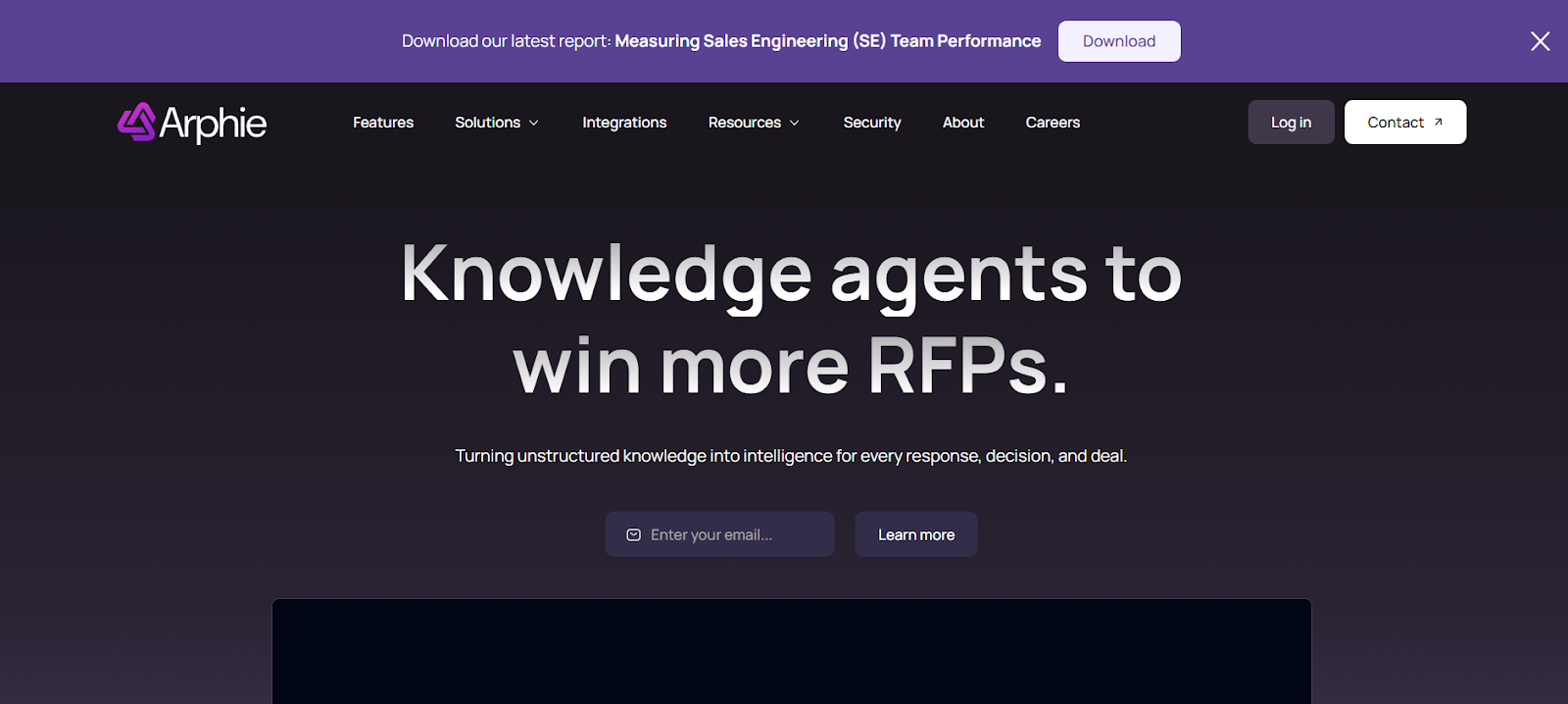
Arphie offers lightweight AI writing and sharing features for small teams. However, it lacks the scalability, compliance, and integration depth needed for larger property management or development portfolios.
Features
- AI-assisted drafting: Generates quick responses for standard RFPs and short proposals.
- Simple content library management: Stores basic templates and documents for easy reuse.
- Quick document sharing: Allows teams to distribute drafts or responses without complex setup.
Pros
- Quick implementation.
- Affordable entry-level pricing.
Cons
- Weak governance and permission structures.
- Accuracy drops on complex or technical submissions.
- Few integrations with enterprise systems.
Gartner Rating: 5/5
A simple tool for smaller teams, but larger real estate firms will quickly outgrow its limited controls and automation capabilities.
Suggested Alternative: Inventive AI offers the advanced automation, governance, and accuracy needed for enterprise-grade RFPs, delivering faster, compliant, and more persuasive responses every time.
Tribble

Tribble supports basic proposal assembly and collaboration for small teams. However, it lacks advanced AI, analytics, and compliance capabilities, making it unsuitable for large or regulated projects.
Features
- Proposal templates: Enables quick setup for standard RFP responses with reusable structures.
- Real-time commenting and feedback: Allows contributors to review and edit proposals simultaneously.
- Basic workflow routing: Assigns simple tasks to users but lacks automation and compliance tracking.
Pros
- Simple and straightforward workflows.
- Minimal training required.
Cons
- No real AI or automation depth.
- Lacks audit or compliance tracking.
- Limited reporting and governance controls.
Gartner Rating: N/A
Adequate for basic proposal management but falls short for large-scale, high-stakes real estate RFPs that demand precision, compliance, and contextual intelligence.
The ten tools we’ve reviewed highlight just how diverse the sales content and proposal management automation market has become. Some lean on simplicity for quick adoption, while others invest in deep AI integration and enterprise-level workflows. With so much variation, the real challenge isn’t just picking a platform; it’s knowing which features will truly move the needle for your team.
Features to Look For in Real Estate RFP Software
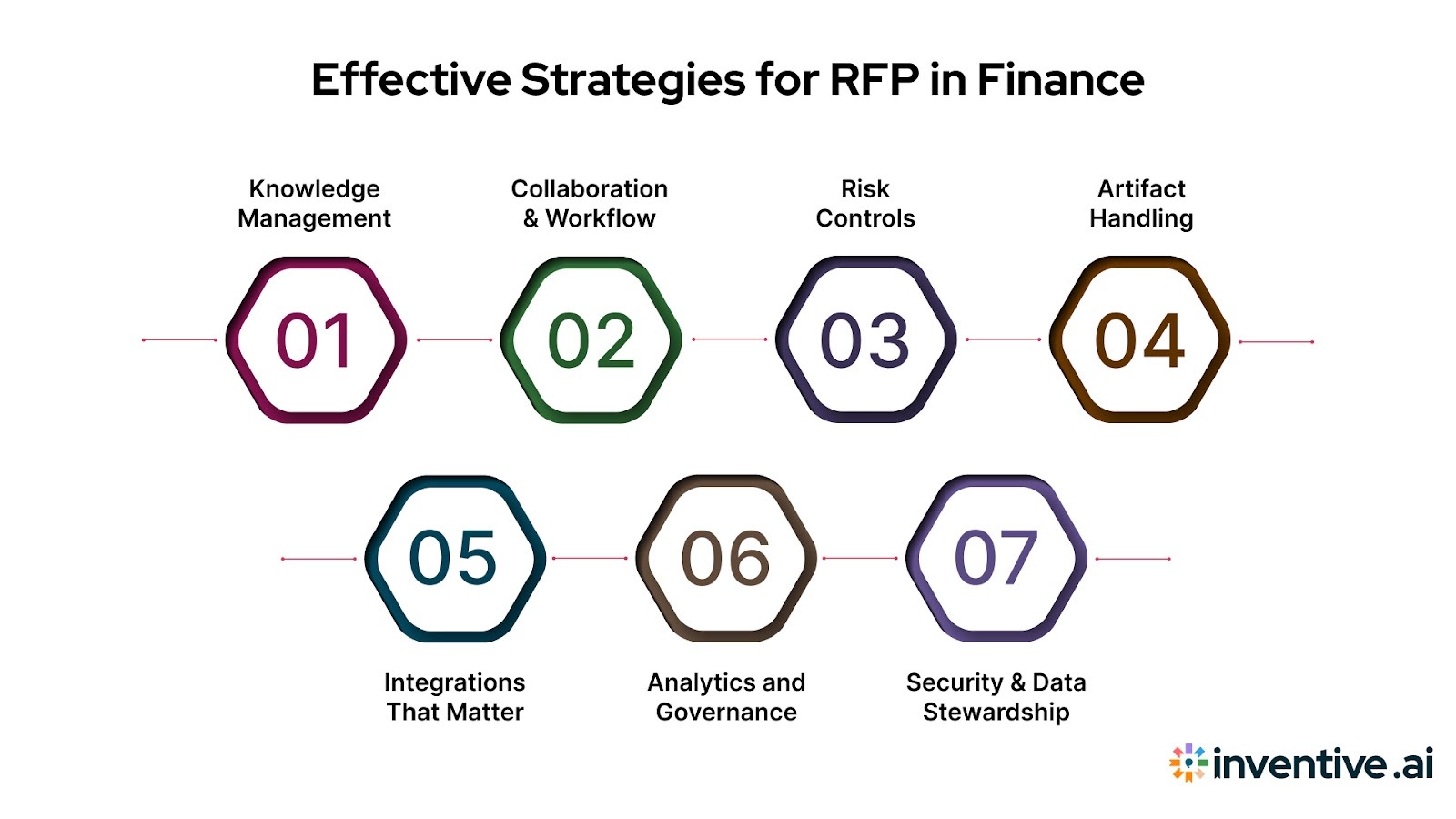
While each RFP platform has unique strengths, only a few core features determine whether it can truly support real estate teams managing complex bids at scale. Below, we outline the key factors to evaluate before choosing a solution.
1. AI and Knowledge Management
AI and knowledge management form the foundation of modern RFP software. For real estate companies handling complex bids, zoning proposals, or construction tenders, precision is everything. The best platforms use AI to find, organize, and suggest accurate responses from your past projects, saving hours of manual work.
This feature ensures every answer is backed by verified data, consistent in tone, and compliant with your brand standards. It also helps you spot missing information or conflicting details before submission, so you can send proposals that are complete, credible, and client-ready.
2. Collaboration, Workflow, and Reviews
RFPs in real estate involve multiple stakeholders, like developers, legal advisors, finance heads, and project managers, all working under tight deadlines. Without proper workflow tools, coordination quickly breaks down. That is why collaboration features are essential.
A strong RFP platform gives you shared dashboards, task assignments, version tracking, and real-time editing, all in one place. It eliminates the chaos of long email threads and ensures everyone knows what to do and when. This keeps proposals moving smoothly from creation to approval without unnecessary delays.
3. Compliance and Risk Controls
Compliance management is non-negotiable in real estate. From insurance documentation to safety certificates and local zoning licenses, every bid requires verified records. An RFP platform with compliance features helps you stay audit-ready at all times. It automatically maps your responses against buyer requirements, tracks expiration dates for critical documents, and maintains a secure vault for certificates and licenses.
This minimizes the risk of last-minute disqualifications and helps you build credibility with clients who value precision and transparency.
4. Attachment and Artifact Handling
Real estate proposals often include detailed attachments, blueprints, floor plans, CAD drawings, and technical exhibits. These large files can be a nightmare to manage manually. That’s why strong attachment handling capabilities are a must. The right RFP tool supports large file uploads, deduplication, and version control, ensuring every document is easy to find and up to date.
This saves your team time and ensures clients always receive complete, organized, and professional submissions.
5. Integrations That Matter in Real Estate
No one wants to juggle between different systems while managing bids. That’s why integration is one of the most important features to consider. Your RFP software should connect seamlessly with tools you already rely on, like Salesforce or HubSpot for CRM, SharePoint or Google Drive for file storage, and Procore or Monday.com for project management. Integration with e-signature tools such as DocuSign or Adobe Sign further simplifies approvals.
These connections reduce data entry, prevent version errors, and create a smooth flow from bid creation to project handover.
6. Analytics and Governance
If you can’t measure performance, you can’t improve it. Analytics and governance features give you the visibility needed to make better decisions. Look for RFP platforms that show metrics like average response time, win rates, and proposal accuracy.
These insights help you identify bottlenecks, measure content effectiveness, and refine your approach for future bids. Governance features also ensure accountability, letting you track who made edits, when approvals were granted, and how content is being used across projects.
7. Security and Data Stewardship
Every RFP contains sensitive financial data, client information, and sometimes personally identifiable details. That makes data security a top priority. Choose a platform that enforces enterprise-grade protection through single sign-on (SSO), multi-factor authentication (MFA), and role-based access control. Advanced tools also isolate project-level data and redact personal information automatically.
This not only safeguards your clients’ information but also builds trust, an important advantage when competing for large-scale real estate contracts.
Defining the right features is only the first step. The bigger challenge is knowing how to weigh them against your team’s priorities and budget. In the next section, we’ll walk through a clear framework for choosing the real estate RFP platform that best fits your organization.
Challenges of Traditional Real Estate RFP Tools
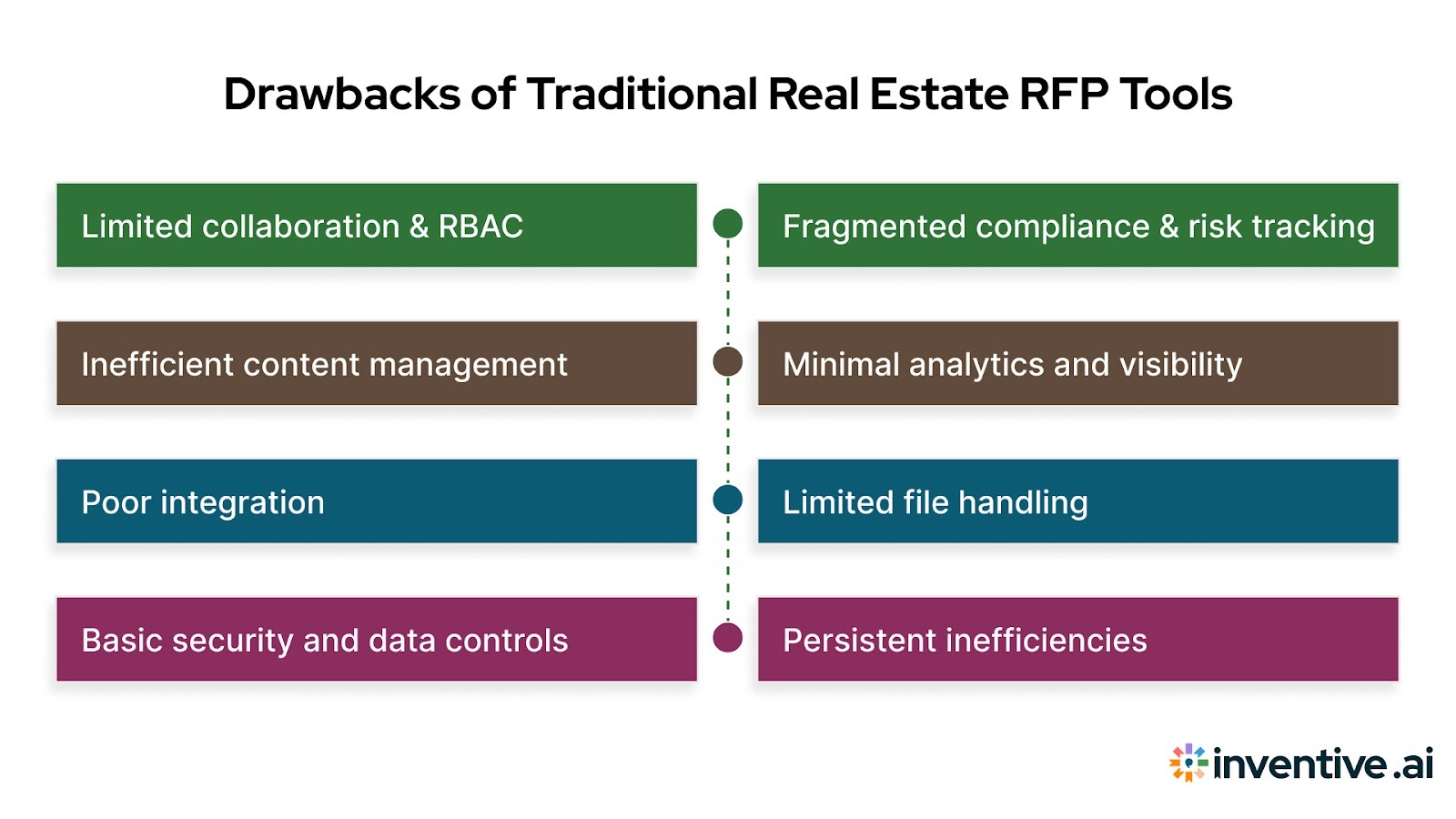
Even with careful selection, relying on traditional RFP management tools can create bottlenecks and inefficiencies for real estate teams. These legacy systems often focus on document storage and basic workflow tracking but fail to address the complex, fast-moving requirements of modern real estate projects.
- Limited collaboration and role-based access: Traditional tools often leave critical documents unattended, forcing teams to work in silos and rely on manual consolidation.
- Fragmented compliance and risk tracking: Managing licenses, certifications, and insurance documents is cumbersome, increasing the risk of non-compliance.
- Inefficient content management: Searching, reusing, and versioning specifications, addenda, and case studies is slow and error-prone.
- Minimal analytics and visibility: Leadership lacks actionable insights into win rates, turnaround times, or library health, making bottlenecks hard to identify.
- Poor integration: Legacy platforms rarely connect seamlessly with CRM, project management, or storage systems, complicating workflows.
- Limited file handling: Large files, CAD plans, technical exhibits, and versioning often require manual processes, risking errors and delays.
- Basic security and data controls: Role-based permissions, project-level isolation, PII redaction, and export controls are limited or absent, increasing data risk.
- Persistent inefficiencies: Even after adopting a tool, traditional limitations continue to slow RFP preparation and increase error potential.
Knowing the gaps in traditional tools shows why modern platforms with AI-intelligent workflows and automation can transform real estate RFPs.
Integration Challenges and Solutions for Real Estate RFP Management
Even modern RFP management platforms face integration hurdles. Properly connecting systems is crucial to ensure accurate, efficient, and secure workflows.
- Older CRMs or project management tools may not support seamless integration.
Solution: Prioritize RFP platforms with native connectors or flexible APIs that can communicate with existing systems like Salesforce, HubSpot, Procore, or SharePoint. - Disconnected systems create data silos, preventing real-time access to RFP content, client information, and historical submissions.
Solution: Centralize document storage and enforce automated syncing across platforms to maintain a single source of truth. - Multiple systems managing the same files can cause version conflicts or duplication.
Solution: Implement version control mechanisms within the RFP software and ensure all integrated platforms respect document hierarchy and updates. - Weak security protocols across integrated systems can expose sensitive data.
Solution: Enforce role-based permissions, encryption, and audit trails across all integrated platforms. - Integration setup can be complex, requiring significant IT resources.
Solution: Plan phased rollouts, conduct thorough testing, and maintain monitoring routines to reduce disruptions. - Teams may resist adopting new workflows if integrations feel cumbersome.
Solution: Provide comprehensive training, clear documentation, and ongoing support to encourage adoption and smooth transition.
With integration challenges addressed, organizations can fully leverage advanced RFP management features to streamline workflows, ensure compliance, and accelerate project timelines.
Inventive AI: Redefining Real Estate RFP Management
Real estate proposals involve hundreds of details, documents, deadlines, and compliance checks. Inventive AI brings order to all of it. It is an advanced, AI-powered RFP platform built to help real estate developers, property managers, and procurement leaders respond to proposals faster, with greater accuracy and confidence.
Key Highlights of Inventive AI for Real Estate Professionals
- AI-Driven Response Engine: Generates complete, context-aware proposal drafts using your organization’s verified data, achieving up to 90% faster turnaround with 95% accuracy.
- Unified Knowledge Hub: Centralizes templates, case studies, financial data, and compliance documents in one secure place, ensuring consistency across every submission.
- Built-In Collaboration and Reviews: Enables seamless coordination between legal, finance, and project teams through real-time editing, automated approvals, and role-based access.
- Compliance and Security Controls: SOC 2-certified infrastructure keeps sensitive project and financial data protected while maintaining audit-ready records for every bid.
- Insightful Analytics: Offers win-rate tracking, response quality metrics, and content performance analysis so you know exactly what drives your success.
Why It Stands Out
Inventive AI is purpose-built for enterprise-level operations and high-value bids. It learns continuously from your past RFPs, adapts to your tone and standards, and ensures every proposal is consistent, persuasive, and compliant. For real estate companies competing in a fast-moving market, Inventive AI delivers measurable impact, faster proposals, higher win rates, and fewer errors.
FAQ
1. What is a real estate RFP management platform?
A real estate RFP management platform centralizes the process of creating, tracking, and submitting proposals for property, development, or lease projects. It streamlines workflows, ensures compliance, and improves collaboration across departments.
2. How can RFP automation improve my team’s efficiency?
Automation reduces manual drafting, organizes documents, flags missing items, and accelerates review cycles. Teams can focus on strategic decisions rather than repetitive administrative tasks, improving speed and accuracy.
3. What should I look for when choosing a real estate RFP platform?
Focus on integration with your existing CRM, project management, and document storage systems, collaboration and role-based access features, analytics capabilities, and support for compliance documentation relevant to real estate projects.
4. How do real estate RFP platforms handle compliance and risk?
Modern platforms include features like checklists mapped to buyer requirements, insurance and licensing tracking, document vaults with expiration alerts, and audit logs to ensure every submission meets regulatory and contractual standards.
5. Can a real estate RFP platform scale with enterprise needs?
Yes. Enterprise-grade platforms offer multi-user collaboration, advanced workflows, analytics for win-rate and efficiency tracking, and secure data management to support large and complex real estate portfolios.

90% Faster RFPs. 50% More Wins. Watch a 2-Minute Demo.
Understanding that sales leaders struggle to cut through the hype of generic AI, Mukund focuses on connecting enterprises with the specialized RFP automation they actually need at Inventive AI. An IIT Jodhpur graduate with 3+ years in growth marketing, he uses data-driven strategies to help teams discover the solution to their proposal headaches and scale their revenue operations.
After witnessing the gap between generic AI models and the high precision required for business proposals, Gaurav co-founded Inventive AI to bring true intelligence to the RFP process. An IIT Roorkee graduate with deep expertise in building Large Language Models (LLMs), he focuses on ensuring product teams spend less time on repetitive technical questionnaires and more time on innovation.

.jpeg)
